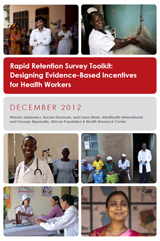
The Rapid Retention Survey Toolkit is intended to allow human resources managers to determine health professionals’ motivational preferences for accepting and remaining in posts. The toolkit builds on the WHO global policy recommendations for rural retention and is based on the discrete choice experiment (DCE), a powerful research method that identifies the trade-offs health professionals (or other types of workers) are willing to make between specific job characteristics and determines their preferences for various incentive packages, including the probability of accepting a post in a rural health facility.
Employing a simplified but reliable version of the DCE methodology, the toolkit guides human resources managers through the survey process to rapidly assess health professional students’ and health workers’ motivational preferences to accept a position and continue working in underserved facilities. It allows for rapid data-gathering and analysis, and the results can be used to create evidence-based incentive packages.??The toolkit includes step-by-step instructions, sample formats, and examples that can easily be adapted to a specific country context, including:
- Survey planning
- Survey design
- Survey instrument development using a specialized software program
- Survey administration
Data analysis and interpretation Presentation of results to stakeholders.